Graduate Program
Across the Evolutionary Divide: the Story of Gaia
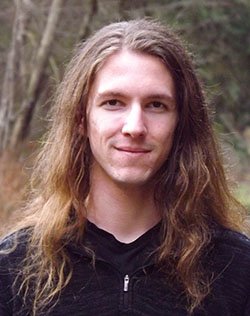 |
| Dominic Sivitilli |
Dominic Sivitilli (Behavioral Neuroscience student with David Gire) spent the summer in Friday Harbor Laboratories in the San Juan Islands studying Enteroctopus dofleini, the giant Pacific octopus. Check out his account of his experience here.
Vertebrates make up but a small minority of the diversity that evolution has made of the ancestral nervous system. If we truly mean to understand cognition, we need to broaden our perspective across the diversity of these forms—we need to look beyond the vertebrate model to other worlds of thought entirely. For this reason, I have chosen the octopus as my model organism.
I laid the groundwork for studying cognition in this new model by consolidating a paradigm to deconstruct and characterize the behavior of Octopus rubescens, the Pacific red octopus, the smaller of the two species local to the Puget Sound (at an adult arm span of around 30 cm). After a year, I was ready to turn my sights on Friday Harbor Laboratories in the San Juan Islands, and to the other species, Enteroctopus dofleini, commonly known as the giant Pacific octopus, the largest species of octopus known.
I spent weeks diving the dark, green depths that wove between the San Juan Islands; on the edge of black, watery gulfs I searched for a long lost cousin. 45 feet below San Juan County Park, my dive team at last methodically encircled a large, camouflaged, breathing mass, as it watched us intently.
Like a fission reaction, word spread of our new lab resident. Before I could catch my breath, a wave of curious and confused descended on Lab 2.
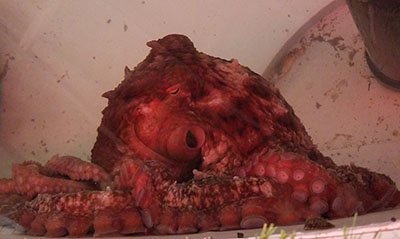 |
Nightfall and finally alone in a quiet, dim lab, I felt my movements being watched. I sat facing my new model, observing her as she continued to fix her gaze upon me. About five feet separated the tips of her opposite arms when she reached them outward—she was young, yet, she seemed so old, reaching out to me from deep evolutionary time.
Unlike the highly centralized nervous system of the vertebrates, that of the octopus exists mostly in their eight flexible arms. Here, in each arm, the nervous system takes the form of a chain of neural clusters, or ganglia, running in parallel to the octopus’ suckers, with each ganglion processing the input from the tens of thousands of sensory receptors from the adjacent sucker. By outsourcing a large degree of motor and sensory processing into localized semi-autonomous neural pathways within these chains, the octopus can process this massive amount of sensory information in parallel while relieving the brain of much of the necessary computational burden to respond accordingly.
When an arm is removed or its connection to the brain severed, it will move freely, respond to touch and recoil from noxious stimuli. This autonomous behavior suggests that the arms are inhibited when attached to the brain, and by selectively removing inhibition of certain peripheral neural pathways, the brain allows the arms to execute behaviors while the other pathways within the arms remain silenced. The large degree of information from the suckers is then consulted to adjust the automated motor response to the immediate and acute representation of the world.
This being before me took a different path entirely to a wholly foreign mind, a journey that began when we parted more than 500 million years ago: two simple-minded cousins setting out to wander aimlessly a long, turbulent road toward cognitive complexity. I named her Gaia.
As I prepared her next tank for her arrival, Gaia was visited regularly by lab residents and visitors alike. Although obviously too small for comfort, her temporary tank allowed the opportunity for visitors to easily interact with her. To the unnerving realization of the uninitiated, even the most gentle contact with her suckers was enough to elicit her arm to ensnare and eagerly coil around idle hands. The more one was to resist, the more eager the arm was to entangle its newly found play-thing, while each sucker searched intently for a relevant stimulus to communicate to the brain.
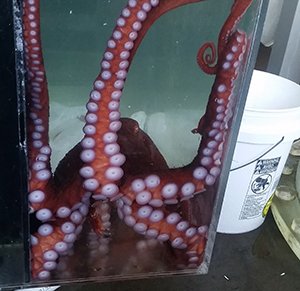 |
She was placed in her new, larger tank and set out immediately to explore its boundaries. Typically, studies of animal behavior employ an ethogram, an exhaustive list of an animal’s behavior. Instead, an automated approach allows me to catalogue not just the behavioral profiles of the entire animal, but that of each arm simultaneously. By then characterizing correlations in movement pattern and symmetry between arms as a function of the sensory information available to the octopus, I can begin to model the flow of information in this system that allows the octopus to coordinate its highly autonomous arms in response to controlled exposure to various environmental conditions, revealing the computational strategies they are employing to coordinate the highly independent divisions of their nervous system. Before, I could only accomplish this with the Pacific red octopus fitting comfortably in a 50 gallon tank. Friday Harbor Labs allowed me to work at a different scale entirely.
Gaia continued to attract the attention of the multitude of residents and visitors during the summer terms of the labs, while I and the occasional team of volunteers, to whom I owe an incredible debt of gratitude, provided enrichment, cleaning service, and a daily sacrificial crab.
After many came to visit her one last time, we returned Gaia to her home below San Juan County Park six weeks after we found her. I then bid farewell to the labs, and the wonderful and welcoming community that I called home for the summer of 2017.
Perceptive, curious, and above all, distant, Gaia manifested everything to me that makes the octopus model so attractive. Two cousins we are, meeting across the evolutionary divide of over 500 million years.
How National and University Fellowships Help Annie Make The World a Better Place
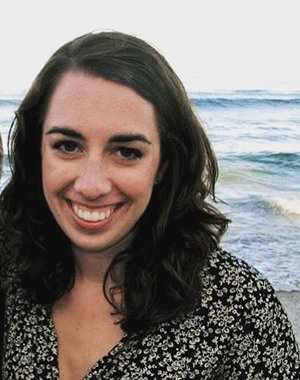 |
Annie Fast is a graduate student in Developmental Psychology working under the mentorship of Dr. Kristina Olson. She was recently selected by the UW Graduate School to receive their Presidential Dissertation Fellowship, which provides tuition waivers, stipend, and health insurance for one quarter. She also was a recipient of the APF/COGDOP research scholarship. We asked Annie about her experience so far in the program and how these awards will enable her to reach her goals.
Let's start with the basics: where are you from and where did you complete undergrad?
I grew up in a suburb of Albany, NY and then moved to Providence, RI to complete my undergraduate degree at Providence College. I came to UW after receiving my Bachelor’s degree from Providence (I can’t believe I moved across the country with just two suitcases!).
How did you wind up at UW and why did you apply here? How do you like living in Seattle?
While I was considering potential graduate school advisors, I was very interested in working Kristina Olson, who happened to be moving to UW the year I would be entering graduate school. So, I applied to UW in hopes of working with Kristina and also the possibility to work with Jessica Sommerville. I was thrilled when I got the offer!
Although I was a bit unsure of moving across the country, I knew that Seattle and UW had a lot to offer me and it helped that I have some extended family in town. Seattle is a wonderful place to live, especially for a doctoral student. As a fan of food and live music, Seattle has provided me with a number of opportunities to have fun when taking breaks from work. I love trying new restaurants in the many different neighborhoods of Seattle and attending concerts at the many intimate live music venues in town. Also, summertime here is absolutely gorgeous and I’ve enjoyed escaping the city to explore the surrounding great outdoors.
What is your research interest and how did you get into it?
My primary research interest concerns human socio-moral behavior and evaluation. That is, I’m curious about when and why humans are prosocial (e.g., helpful, generous) and how they judge other people’s prosocial and antisocial behavior (i.e., moral evaluation). As an undergraduate, I studied philosophy in addition to psychology. The philosophy coursework on ethics and social responsibility paired with psychology coursework on development and social cognition inspired me to pursue research on this topic. I continue to be fascinated in what determines human prosocial vs. antisocial behavior, an issue that has been discussed for centuries but is still incredibly relevant in modern society. Although theorists have moved beyond a black and white understanding of human social behavior (humans are not simply good or evil and selfless or selfish), we are still learning about how factors might promote goodness, particularly early in development.
What is the name of your project and the funding source?
My project is titled “What Governs Goodness? The Role of Emotional Reward in Motivating Children’s Generosity”. I received the UW Graduate School Presidential Dissertation Fellowship, which funds me for one quarter, and I received a Graduate Research Scholarship ($1,000) from the American Psychological Foundation/COGDOP to support my dissertation recruitment costs.
How might your research change the world?
Given that my work seeks to describe factors that influence generous behavior in early development, I hope that my work changes the world by describing how we can promote early acts of generosity. Perhaps determining the factors that initiate and drive generous behavior early in development will also allow us to better understand and prevent the circumstances in which individuals choose to not be generous.
Do you have any advice/tips/suggestions for others who may apply to this opportunity? About graduate study in general?
As mentioned above, the most challenging aspect of applying to these funding opportunities is striking the balance between background/importance of the work and the details about the studies themselves. I recommend writing many drafts to find the best balance for your project. And show it off to others! The more feedback you can get (especially from individuals outside of your area), the more you can improve on that balance.
I want to emphasize that I definitely suggest applying to the UW Graduate School Presidential Dissertation Scholarship, as it provides an entire quarter of funding to focus on your own work and offers a great opportunity to work on succinctly describing your work!
What do you hope to accomplish with the funding and/or while in the UW Psychology graduate program?
With the funding, I hope to focus my time and resources on recruitment for my dissertation project. I still have a lot of data collection to complete yet and I look forward to making quicker progress on data collection so that I can see what I find! I’ve been fortunate to have several wonderful teaching opportunities in the department during my graduate career, but I’m happy to have time and resources right now to focus on my dissertation research. Looking forward to sharing what I find with everyone!
What you plan to do once you complete your PhD?
I am currently on the job market, seeking a professor position at a liberal arts college or small university. I am also considering visiting professor and teaching postdoc jobs. It is exciting to think about where this job search journey may take me, though if something pans out for me this year, I will miss everyone at UW!
Supplemental Reading:
With Go-Map Diversity Fellowship Funding, Student's Attention is on Human Attention
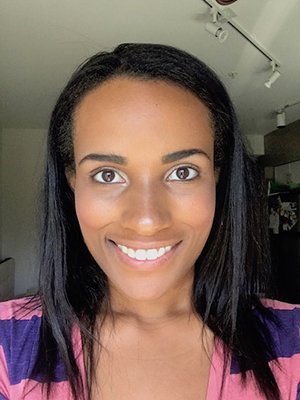 |
Miranda Petty (a Cognition & Perception graduate student with John Palmer) was awarded a recruitment fellowship from the Graduate Opportunity and Minority Achievement Program (GO-MAP) of the Graduate School when she accepted the offer to join the Psychology PhD program last year. This fellowship provides tuition assistance, stipend, health insurance, and makes available the close-knit network of the GO-MAP community. The Psychology Department is very thankful that GO-MAP recognizes gifted students from the onset of their graduate careers. Now that Miranda has entered her second year, we thought we'd ask her a few questions.
Let's start with the basics: where are you from and where did you complete your undergrad degree?
I was born and raised in Louisville, Kentucky. I moved to California after graduating high school, and I completed undergrad at California State University, Fullerton.
How did you wind up at UW and what drew you to apply here? What do you think about living in Seattle?
I chose UW because I felt that it was the best research fit, and everyone in the Psychology department was just so friendly and welcoming. I have also always wanted to live in Seattle; I just had a feeling that I’d like it here, and so far, I love it.
What is your research interest and how did you get into it?
I do research on attention. I became interested in attention research after spending a summer working with Dr. George Alvarez at Harvard University. Attention is a really interesting topic that most everyone has some intuition about. We know what it feels like to try and divide our attention between multiple things, and we realize that some tasks are impossible to complete at once (e.g. we cannot carry on a conversation with someone while also reading a book). Yet there is still a lot that is unknown about the human attentional system, and there are a lot of sophisticated ways to study attention using psychophysics and brain imaging.
What is the name of your project?
The title of my first-year project is “Comparing the Roles of Perception and Decision in Spatial Selective Attention.” This project was funded by Dr. Geoffrey Boynton’s grant from the NIH.
How might your research change the world?
Deficits in the attentional system can have a significant impact on our ability to complete daily tasks. There are some disorders, such as Attentional Deficit Disorder (ADD), that are obviously related to attention, and attention research has done a lot to help us identify the symptoms of these disorders and develop treatments. There are other disorders that are less obviously related to attention. For example, recent research has hypothesized that attention may be related to dyslexia. Research that focuses on how attention is involved in various cognitive tasks will help us to understand the links between attention and cognitive disorders, even those that might not seem obvious.
Do you have any advice/tips/suggestions for others who may apply to this opportunity? About graduate study in general?
I would without a doubt recommend that other people apply for this fellowship and become a part of the GO-MAP community! Not only is it a great funding opportunity, but being involved with GO-MAP and attending the various events and workshops that they organize each year will allow you to connect with a diverse set of people from all over the UW campus. Even if a graduate student decides not to apply, I would strongly suggest they still participate in GO-MAP events. I made so many meaningful connections through GO-MAP that I likely would not have made otherwise.
What do you hope to accomplish with the funding and/or while in the UW Psychology graduate program?
Because of my GO-MAP funding, I was able to complete two experiments for my first-year project, and I am currently in the process of writing a manuscript of this project to submit for publication. As a graduate student at UW, my main goals are to continue developing a full body of attention research, gain more teaching experience, and seek opportunities to mentor students from various socioeconomic backgrounds.
Supplemental Reading:
- Brianna Yamasaki (Cogntion & Perception with Chantel Prat), Ashwin Bhandiwad (Animal Behavior with Joseph Sisneros), Jessica Chen (Adult Clinical with Ronald Smith), Exu Anton Mates (Animal Behavior with Jim and Renee Ha), and Jose Ceballos (Cognition & Perception with Chantel Prat) also received fellowship awards from GO-MAP and shared their experiences.
- Graduate Opportunities & Minority Achievement Program (GOMAP)
From Rural England to Urban Seattle with NRSA Funding to Support our Visual World
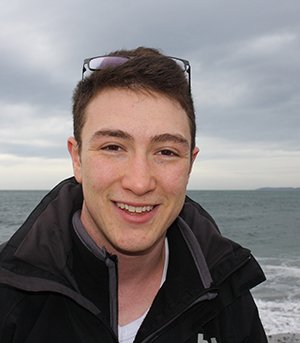 |
Kit Moreland (Cognition & Perception graduate student working with Geoff Boynton) is our latest student to receive predoctoral funding from NIH (NRSA, or National Research Service Award) for his research on divided attention. The background of this research award was covered in a previous article. Learn more about Kit below!
Let's start with the basics: where are you from and where did you complete undergrad and masters?
I am from rural Northumberland in the North East of England. I did my undergraduate at the University of Glasgow and a masters at the University of Oxford.
How did you wind up at UW and why did you apply here?
I was interested in doing a longer PhD in the US as opposed to three years in the UK so I started looking into labs and the Vision and Cognition group looked very interesting to me so it got on my short list. After a very fun series of interviews over Skype it was very clear we had a good fit so UW became my top choice.
What is your research interest and how did you get into it?
I am interested in how the brain selects information from the visual world and then from this limited information creates our perception of the world. I am constantly amazed that we have such the rich illusion that we see everything, when in reality this is far from the truth. I was introduced to perception during undergraduate lectures and very quickly joined a lab for a summer project, and then never left the field. Vision is itself interesting but more than that it is one of the best understood areas of the brain and one which we have most ability to give input which makes it an excellent model system to study broader psychological and neuroscientific concepts.
How did you feel when you learned that your application was accepted?
Firstly, we had not heard for such a long time we assumed we had not been funded and were deciding when to resubmit. Fortunately, we agreed to postpone for two deadlines. I then received a highly ambiguous email and it was several weeks later and after sending many documents back and forth that it was confirmed. There was not really one moment in which I knew I had been successful. Of course, I was still very excited. It is very motivating to know that someone out there values your work and wants it to happen.
What is the name of your project?
Computational and neural mechanisms of divided attention in vision.
How might your research change the world?
My research is about divided attention. That is, to what extent are we able to do two things at once, and what kinds of things can we do at once without a cost? This has broad impacts for many tasks, such as driving. For example, imagine if we knew the best layout for dashboard information to allow you to take the least amount of time with your eyes off the road.
Do you have any advice/tips/suggestions for others who may apply to this opportunity? About graduate study in general?
Start writing early and focus on the documents related to training. They should not be taken lightly. Pay attention to your formatting, it should be easy to read and even attractive. Ask to borrow some successful examples and their reviewer’s comments. Try to understand why they were successful and copy them.
What do you hope to accomplish with the funding and/or while in the UW Psychology graduate program?
I hope to complete a series of behavioral experiments and move on to learning a new skill in fMRI. The funding will also allow me to travel for conferences to communicate my research findings. I hope to write 2-3 papers on the grant topic.
Supplemental Reading:
Welcome to our 2017 Cohort!
Welcome to our new graduate students!
This past September, 17 new graduate students began their doctoral studies in psychology at the University of Washington.
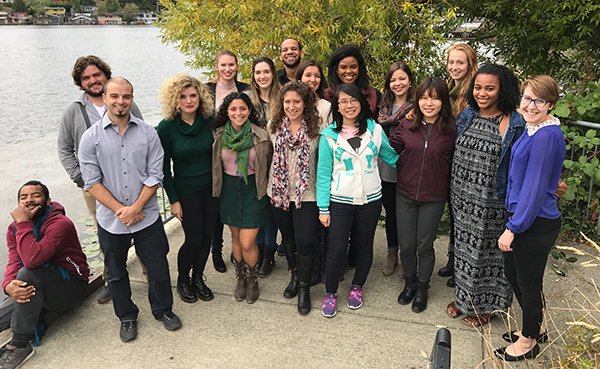 |
New students have arrived from across the US and internationally. Within the US, students have received degrees from institutions on the East Coast (Harvard, University of Baltimore, Dartmouth, Villanova), the Southeast (Vanderbilt, Kennesaw State), the West Coast (University of California Santa Barbara, Western Washington University), and many places in between (Denver University, University of Michigan, Notre Dame, Northwestern, Albion College, Arizona State). Two students also completed their undergraduate studies here at UW. Internationally, students have received degrees from Quest University in Canada, Bilkent University in Turkey, and University of Taipei in Taiwan.
This group is already receiving recognition for their outstanding potential through fellowships and awards. Three students were awarded Top Scholar summer funding from the psychology department during our competitive recruitment cycle. One student joins us with a National Science Foundation grant, and one student has received two years of funding from the WRF Neuroengineering Fellowship through UW Institute for Neuroengineering and eScience.
New students attended a weeklong orientation before the official start of fall quarter, organized by an advanced graduate student who was selected as the department’s Lead TA. This year’s Lead TA, Katy Fladeboe, is a 4th year student in the developmental area working with Lynn Fainsilber Katz. Orientation events included a campus-wide TA conference; a formal welcome from our new Department Chair, Cheryl Kaiser, and graduate advisor, Jeanny Mai; presentations from departmental and campus-wide organizations and resources; and panels from faculty and graduate students. New students particularly enjoyed getting to know their cohort through the orientation process and, of course, learning about all the best local places to eat!
We look forward to seeing all of their future accomplishments!
Supplemental Reading:
Updates from the Diversity Steering Committee
The Diversity Steering Committee (DSC) has new leadership for the 2017-2018 academic year. Starting this past summer, Adriana Germano (third year social/personality psychology student) joined Frances Aunon (fourth year adult clinical psychology student) as DSC co-chair. Together, Frances and Adriana will share coordination and leadership of DSC’s many initiatives, along with this year’s faculty chair, Bill George.
DSC’s previous two fearless co-chairs, Arianne (Ari) Eason and Sarah Edmunds, have taken their next steps in academia! Congratulations Ari and Sarah and thank you for all your hard work last year. We can’t wait to see what great work you do!
This autumn quarter, we welcomed many new graduate student members by presenting at psychology departments’ new student orientation. New members this year include: first year students Mariah Corey, Liana Galtieri, Michelle Smith, Terrence Pope, Jessica Glazier, Lauren McClain, Imani Burris, and second year student Laura Vianna. Welcome!
At our first meeting of the year, we laid the ground work for this upcoming year. New DSC projects include: increasing outreach with UW undergraduate students through hosting a research data blitz, coordinating campus-wide Allen L. Edwards Psychology talks on diversity, and creating a microagression workshop. We look forward to sharing more details about each of these projects soon, including how to get involved with them.
The DSC looks forward to supporting graduate students in exploring diversity science in their coursework, research, teaching, and other domains of engagement within and outside the UW. Please contact us at psychdsc@uw.edu for more information.
Supplemental Reading:
Graduate Accomplishments
Spring 2017
Our 46th Annual Psychology Reserach Festival was held at the Waterfront Activities Center (WAC) last May. After a day full of research talks and yummy snacks, the event closes out with an awards ceremony recognizing faculty and students who went above and beyond in their service to the department.
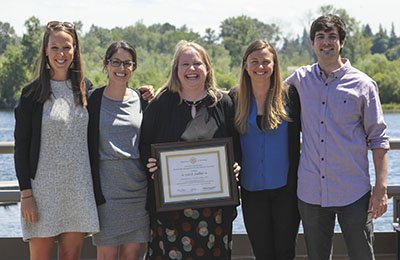 |
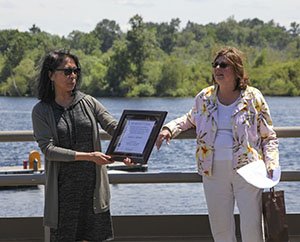 |
|
|
Libby Marks, Natalia Garcia, Lori Zoellner, Rosie Walker, & Pete Rosencrans |
Sheri Mizumori & Nancy Kenney |
The 2018 Davida Teller Distinguished Mentor Award went to Lori Zoellner (Adult Clinical), her current students gave a touching tribute to the ways in which she has been an exemplary advisor before presenting her with a certificate.
Sheri J.Y. Mizumori (Behavioral Neuroscience) and Nancy J. Kenney (Social Psychology & Personality) each surprised each other with awards of service. Sheri most recently completed 9 years as the Psychology Department Chair, while Nancy completed 14 years as the Associate Chair of Graduate Training.
Additional awards presented: The GPAC service award, an award for graduate students, from graduate students. This year Saethra Fritscher (Animal Behavior student with Mike Beecher) and James Kit Moreland (Cognition & Perception with Geoff Boynton) received the shared honor. Distinguished TA Awards went to Tanner DeLawyer (Behavioral Neuroscience with Steve Buck) and Annie Fast (Developmental with Kristina Olson). This year the Department Service Award went to our GPAC representatives, Annie Fast (Developmental with Kristina Olson) and Ashley Ruba (Developmental with Betty Repacholi) and our Diversity Steering Committee student co-chairs, Arianne Eason (Social Psychology & Personality and Developmental with Cheryl Kaiser and Jessica Sommerville), Sarah Edmunds (Child Clinical with Wendy Stone), and Frances Aunon (Adult Clinical with Jane Simoni). Our summer fellows also received certificates for the Alcor and Hunt fellowships; descriptions of their awards were in our previous newsletter.
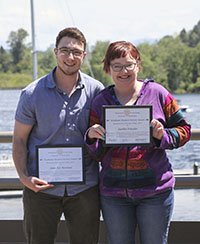 |
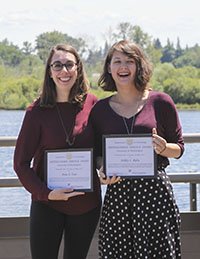 |
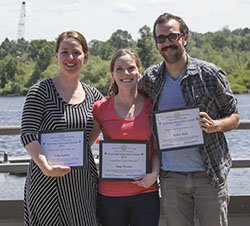 |
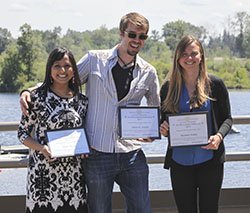 |
|||
| Kit Moreland & Saethra Fritscher | Annie Fast & Ashley Ruba | Erika Ruberry, Paige Peterson, & Rob Mohr | Prerna Martin, Adrian Andelin, & Rosie Walker |
Spring quarter is also one of our busiest quarters for accomplishing milestones in our department.
We gained 5 new doctoral candidates: Liz Bird (Adult Clinical with William George), Charlotte Brill (Adult Clinical with William George), Lizzy Karp (Child Clinical with Wendy Stone), Erika Ruberry (Child Clinical with Liliana Lengua), and Linda Zou (Social Psychology & Personality with Sapna Cheryan).
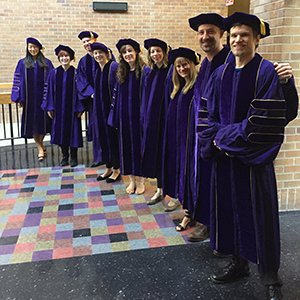 |
Two students completed their masters': Julie Davis (Behaviorial Neuroscience with Sheri J.Y. Mizumori) and Brian Jackson (Behavioral Neuroscience with David Gire).
Three graduate students completed their PhDs: Sarah Faegre (Animal Behavior with Renee Ha), Valerie Tryon (Behaviorial Neuroscience with Sheri J.Y. Mizumori), and Emma Wampler (Cognition & Perception with Lee Osterhout).
We closed out our academic year by holding our Psychology PhD Hooding Ceremony on Saturday, June 10, 2017.
Summer 2017
Dominic Sivitilli (Behavioral Neuroscience with David Gire) spent the summer in Friday Harbor Laboratories in the San Juan Islands studying Enteroctopus dofleini, the giant Pacific octopus. Read about his experience here. It's a fascinating piece which describes studying and playing with Gaia, giving insight on research process such as the structure of her temporary lab home and tracking her movements.
James Kit Moreland (Cognition & Perception with Geoff Boynton) received a NRSA funding for his research on divided attention. Check out his research spotlight.
Frances Aunon (Adult Clinical with Jane Simoni), A. Paige Peterson (Adult Clinical with Corey Fagan), and James Kit Moreland (Cognition & Perception with Geoff Boynton) passed their general exam and advanced to candidacy. While Joris Vincent (Cogntion & Perception with Steve Buck) and Frances Aunon (Adult Clinical with Jane Simoni) completed their master's degrees. While master's degrees are optional in our PhD program, many of our students will opt for them.
Finally, we said farewell to six of our students who completed their PhD degrees: Nicole Stettler (Child Clinical with Lynn Fainsilber Katz), Jennifer Staples (Adult Clinical with William George), Kristine Thimm-Louie (Child Clinical with Kevin King), Helen Valenstein-Mah (Adult Clinical with Mary Larimer), Joris Vincent (Cogntion & Perception with Steve Buck), and Joyce Yang (Adult Clinical with Jane Simoni).
Autumn 2017
Ezgi Yucel (Cognition & Perception with Ione Fine), received a WRF Innovation Graduate Fellowship in Neuroengineering, co-funded with the eScience Institute, from the UW Institute of Neuroengineering.
Annie Fast (Developmental with Kristina Olson) received a 2017 APF/COGDOP Graduate Research Scholarship. She has previously been awarded a Graduate School Dissertation Fellowship. Please see her research spotlight.
Prerna Martin (Child Clinical with Shannon Dorsey) has received an award from The Society for Implementation Research Collaboration for Outstanding Student Investigator. Previously, Prerna shared her summer research experience in New Delhi slums.
Hilary Lambert (Child Clinical with Kate McLaughlin) won a prestigious dissertation award from the International Society for Traumatic Stress Studies.
Hutch News profiled Psychology doctoral student Vasundhara Sridharan (Social Psychology & Personality with Yuichi Shoda), in this Science Without Borders article.
Megan Ramaiya (Adult Clinical with Jane Simoni) works toward the development of culturally adapted suicide prevention interventions in Nepal.
Libby Marks (Adult Clinical with Lori Zoellner) recently had a first author publication in Psychological Bulletin, "Can't get it out of my mind: A systematic review of predictors of intrusive memories of distressing events."
Join us in congratulating our graduate students on making outstanding advancements in their education, research, and community impact!